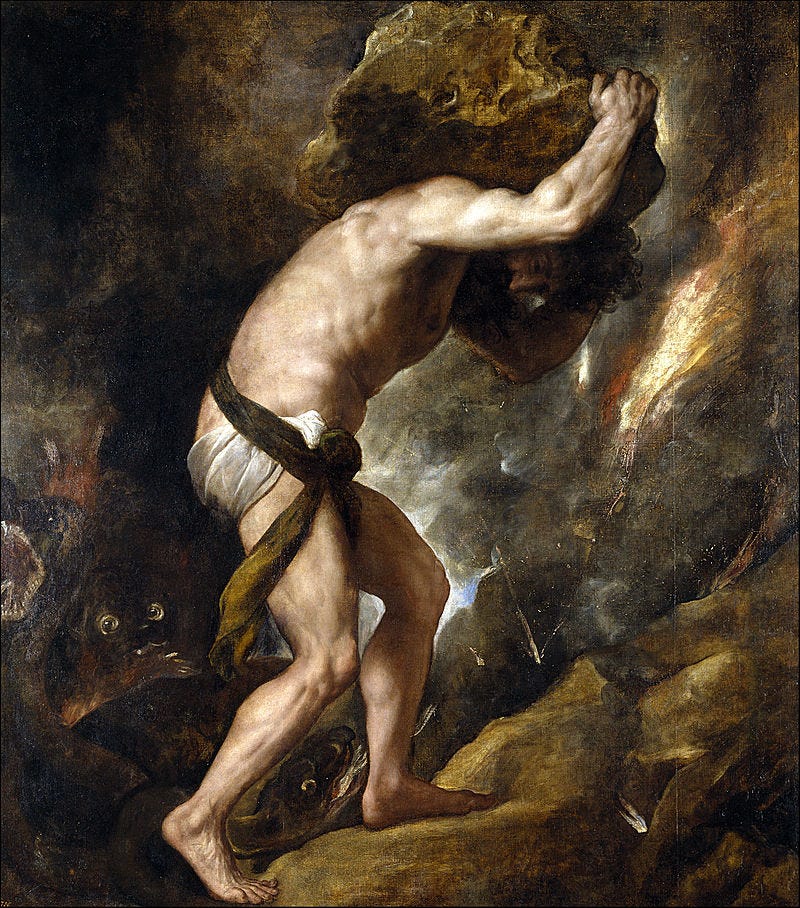Double, double toil and trouble; Fire burn and caldron bubble. Fillet of a fenny snake, In the caldron boil and bake; Eye of newt and toe of frog Wool of bat and tongue of dog, Adder's fork and blind-worm's sting, Lizard's leg and howlet's wing, For a charm of powerful trouble, Like a hell-broth boil and bubble. Double, double toil and trouble; Fire burn and caldron bubble. Cool it with a baboon's blood, Then the charm is firm and good.
—William Shakespeare, Song of the Witches (from Macbeth)
,

The Sisyphus of Sentences.
I find myself locked in a struggle, pushing a monumental object up a precipice without bounds, wrestling the weary words perched beneath the ghostly glow of artificial light.
My fingers hover over the keyboard, pressing one at a time, until formulations of coherence appear.
I’m drawn to such allure, as if a moth’s flame in hesitant lands touches the unsure will to consume (or illuminate).
Writing, in this modern age, feels as if the Greek myths of old have come back to life; Prometheus’ flame beckoning knowledge, laborious labors favoured to Hera’s son, as Odysseus journey’s from Troy back to Ithaca1.
It’s a tempest, the cacophony of verbiage howled to restless algorithms, notifying us of hummed bugs drowned in the quiet places of our individual and collective thoughts.

Each sentence is a thread pulled from Clotho, left to be decided by the Fates what to do with it; everything placed in its particular orientation and purpose within the ecosystem at large, unraveling a maelstrom of wonderous distraction held to forces against their own barded will.
I think of Shakespeare in this regard—the bard, the quill-wielder more wild than more, especially in a tempestuous time.
Did his hand falter as mine does now, poised above parchment?
He wrote for a world as fractured as ours, though his rift lay between cobblestones and courtrooms, groundlings and nobles.
The pit below the pendulum teemed a stage with unwashed jest and jab, eager to the demanding symphonies of the human condition.
I envy the tangibility—the raucous laughter, the shared gasps, the sound of silence thick with reflection, existing as shadowy ether: fleeting glances and half-hearted scrolls.
Above the balconies crafted in the finest Elizabethan verse, the crossroads of bawd and brilliance, between the base and the sublime, I write into a void shaped screen of words devoured by algorithms.
My words, digested and forgotten (where brevity is king of the hill and profundity is a stranger), is brutality in bestial presentation, flesh and blood crowding the crown shared in ephemeral communion with a global Thearte.
What is the modern writer to do when the quill meets not parchment but pixels, as water droplets in morning dew?
I write for no groundlings, no nobles, but for phantoms, disembodied presences scattered across continents, a mirror held to my own projected reflections recalled to Herman Hesse’s Siddhartha.
My struggle is not simply the act of creation but the act of preserving it in a world that devours meaning and demands evermore and more…
Who do I write for?
This is a question I often ask myself and others, and although others have given various reasons, I’m no closer to closure for my own purposes, yet, there is a strange kinship between us, bound by the Sisyphean struggle of rendering the ineffable.
Inklings longing, stained hands grappling with mortality, love, power, and the divine; not only with those eternal themes, but with the oppressive weight of immediacy, the relentless demand for relevance.
Shakespeare had the plague, I have algorithms.
Both distort time, both scatter audiences, both make the writer’s task an act of defiance, flittering attention like dragonflies on water.
Is it the echo of someone else urging me to join fellowship carved in meaningful chaos, or, do I write to stave off the deathbed gnawing from the unspoken void in my thoughts?
Perhaps it is all of these—perhaps none.
In every age, writing is rebellion.
Shakespeare rebelled against the tyranny of silence, against the strictures of a society that sought to bind imagination, while I rebel against the relentless noise surrounding me, adding fuel to informational fire, demands consumed rather than understood.
Each word is an act of resistance, a fragile bulwark against the fleeting and the hollow, as the ink settles for the enduring words anchored in the tumult of history, forged from this time, this struggle, this rebellion.
To write is to declare that meaning still matters, the absolute in doubt, willowing wisps ignis, eirenicon to corybantic uproar in discordant brume, the nocturnal intimations sentenced still heard today.
I think I finally found a way to forgive myself, for past mistakes, and I think that’s the first step. I’ve dug two graves, and I can’t pretend that I’ve been perfect, living in fear. “Oh, what a world,” the things I hear, if I could act on my revenge: some kill, some steal, some break our hearts. And, if I don’t want to let go, in the grave I’ll rot, so I’d rather walk. Is my pain your freedom? Enjoy
—paraphrased from Jahseh Dwayne Ricardo Onfroy’s (a.k.a., XXXTentacion) Revenge
What stirs within you?
What shapes the fragile thoughts of your vessels boundless void?
For references to Prometheus, see Hesiod's Theogony (lines 507–616) and Works and Days (lines 42–105), which explore the myth of stolen fire as a metaphor for human striving.
The labors of Hercules, central to Greek mythology, serve as allegories for perseverance and ingenuity (Apollodorus, Bibliotheca, Book 2).
Odysseus’ journey, as depicted in Homer’s Odyssey, reflects a universal struggle for meaning and resolution amid adversity (Odyssey, trans. Robert Fagles, Books 1–24).

